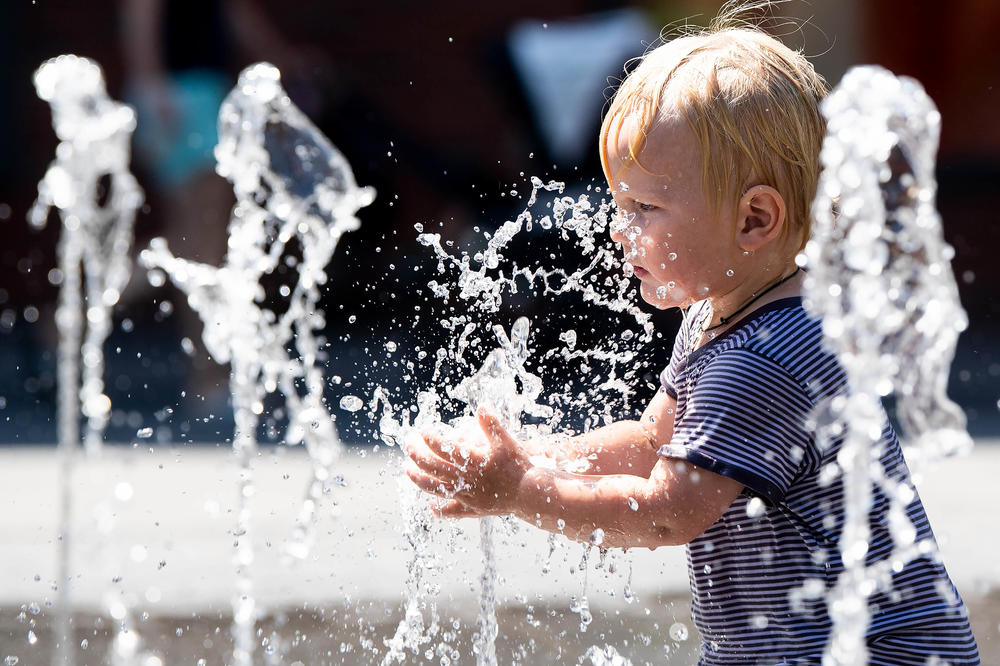Living with Hotter Weather
Social life can be adapted to hot, dry summers, both in rural areas and small towns
Jul 29, 2020
A nice way to beat the heat. A two-year-old splashes in an urban fountain in July 2019 at temperatures near 40 degrees Celsius.
Image Credit: picture alliance/Federico Gambarini
The past two summers in Germany have made it clear that climate change is in full swing. Even if the goal of limiting global warming to less than 1.5 degrees Celsius can be achieved, heat waves and periods of drought will be more widespread in Germany in the future. “Climate change is no longer just about possible scenarios,” says Klaus Jacob from the Environmental Policy Research Centre (FFU) at Freie Universität Berlin. “We are dealing with acute problems that we as a society will have to react to.”
Klaus Jacob does research on the political design of ecological transformations and advises political institutions on environmental policy and climate change. Together with three partners, he is leading a research project on the subject of heat in rural and small town areas. Under the title “GoingVis” – short for “Governance through integrative visions” – the project partners are investigating how everyday life in small towns can be adjusted so that people can cope better with higher temperatures. For practical aspects, the researchers are partnering with the small town of Boizenburg/Elbe in Mecklenburg-Western Pommerania and the spa town region Elbe/Elster. The project is being funded by the German Federal Ministry of Education and Research.
“We want to show that there are other possibilities.”
“Adaptation to rising temperatures has long been an important topic in large cities,” says political scientist Klaus Jacob. To that end, city administrations created new jobs and developed strategies, often in cooperation with nearby research institutions. “Small and peripheral cities do not have these resources,” Jacob says. “There the administration is often on its own, and the staff has little if any capacity to handle additional tasks.” GoingVis therefore relies on the participation of local residents instead of solely on the administration. That is also an opportunity. “The current perspective focuses on planning and technical solutions,” says Jacob. “We want to show that there are other possibilities.”
The researchers are focusing on concrete behavioral changes and social practices that can make cities and their populations more resilient to climate change. “But these changes only make sense if everyone participates together,” says Klaus Jacob. One example is the siesta that is widespread in the Mediterranean region. Jacob thinks that an extended lunch break in the summer time would also make sense in Germany. He says, however, “A siesta only works if everyone takes a break together and gets involved. That also means changing opening times or child care hours.”
Extending Green Areas and Planting Campaigns
GoingVis also deals with providing the necessary coordination. The researchers are trying to bring residents together around a table to develop solutions for the future together. Various participation formats and workshops come into question for this purpose. For example, green spaces in the city can tended collectively or walks in the forest and planting activities can ber undertaken together. In particular, it is also about diversifying flora and making it more resistant to drought and forest fires. Another example is a city map currently being developed by citizens in Boizenburg. The map provides information about cool places and water dispensers.
Jacob points out that it is very important to include so-called silent groups in the dialogue. He specifies, “So people from social milieus who tend to be less involved in the political debate about climate change can get involved.” The focus here is on low-income, undereducated classes and migrant groups. On the other hand, experience shows that it is also important to look at another social group. “That is people who don’t need collaborative solutions,” says Klaus Jacob. “People who have a large house with air conditioning and a back yard don’t have to worry about making their neighborhood more suitable to beat the heat.”
GoingVis Connects People
The workshops hosted by GoingVis also provide an opportunity for people from different social groups in cities to find each other. Boizenburg, for example, is a typical commuter city. “The people usually work outside the area during the day, and they are usually at home in the evening,” says Jacob. Joint activities for a climate-friendly life could promote social cohesion. In the upcoming workshops, the researchers are hoping to tap the knowledge of migrants. As Klaus Jacob says, “Many of them come from countries where they have a great deal of experience in dealing with drought and heat. We can learn a lot from them.”
This text originally appeared in German on June 21, 2020, in the Tagesspiegel newspaper supplement published by Freie Universität.

